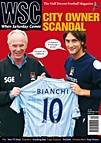 This has been a slightly desperate month for the football pages. A non-tournament summer tends to create two main problems. First, there’s the fact that nothing’s really happening. How, at times like these, to fill the 12-page daily sport supplement and stoke the creative muse of 14 weekly picture-bylined columnists? Football has, of course, been the main impetus behind the mushrooming of all this extra space. Without actual matches, we’re left with a noisy and occasionally ragged exercise in misdirection.
This has been a slightly desperate month for the football pages. A non-tournament summer tends to create two main problems. First, there’s the fact that nothing’s really happening. How, at times like these, to fill the 12-page daily sport supplement and stoke the creative muse of 14 weekly picture-bylined columnists? Football has, of course, been the main impetus behind the mushrooming of all this extra space. Without actual matches, we’re left with a noisy and occasionally ragged exercise in misdirection.
The Archive
Articles from When Saturday Comes. All 27 years of WSC are in the process of being added. This may take a while.
 Online reaction to David Beckham’s move to LA Galaxy wasn’t about informing readers but enraging them, believes Ian Plenderleith , part of a trend that values level of response above everything else
Online reaction to David Beckham’s move to LA Galaxy wasn’t about informing readers but enraging them, believes Ian Plenderleith , part of a trend that values level of response above everything else
The internet was supposed to mean the end of newspapers. Why pay for an unwieldy item that gets ink on your hands when you can see it all on the computer for free? Yet print has survived, and not just because you can’t take your PC with you on the Tube. It’s also because the internet has developed into a medium with a different kind of writing.
 The poor technique of British kids demands action – money-making, patronising action, focusing on the individual ahead of the team and fronted by a clone of Barry from EastEnders. David Stubbs is impressed
The poor technique of British kids demands action – money-making, patronising action, focusing on the individual ahead of the team and fronted by a clone of Barry from EastEnders. David Stubbs is impressed
It is commonly acknowledged, except, apparently, among the people charged to do something about it, that there is a skills deficit among young British footballers. Despite years of berating from the sidelines, tournament after tournament sees Our Boys shown up, even in the preliminary games they end up winning, as lacking in the simple but delicate arts of the game. A blood-and-thunder philosophy still prevails. The ball is not passed but “got rid” of. Players puff their chests, as if prepared to run through walls on request, charge about like lions on heat for the first 20 minutes of every game, then “mysteriously” run out of energy after an hour. Meanwhile, international opponents expend a fraction of the effort to much the same effect by simple dint of having the confidence in their ability to control and stroke about the ball.
 Russia in 1992 and Spartak Moscow begin their era of dominance. By Saul Pope
Russia in 1992 and Spartak Moscow begin their era of dominance. By Saul Pope
The long-term significance
To a background of hyperinflation, widespread poverty and rocketing alcohol-related deaths, Russia held its first national championship for almost 80 years. That previous championship ended in controversy; Odessa were not awarded the 1913 title due to fielding too many foreigners. Now, with the country in chaos, football was hardly a priority – attendances were down almost 50 per cent on 1991. However, these were the first shaky steps towards creating what is now one of Europe’s richest leagues, the Russian Premier League, thanks largely to the vast amounts of money pumped in by those who got rich during the privatisation of former state industries, which started in 1992.
 Dunga played for two of Brazil’s dullest coaches and is now following in their footsteps – but none the less his team conquered the opposition to win another Copa América. Rodrigo Orihuela reports
Dunga played for two of Brazil’s dullest coaches and is now following in their footsteps – but none the less his team conquered the opposition to win another Copa América. Rodrigo Orihuela reports
Were it not for Sebastião Lazaroni, Carlos Alberto Parreira would surely be remembered as Brazil’s most defensive coach ever. Parreira’s 1994 World Cup-winning side were the antithesis of stereotypical Brazilian jogo bonito, but managed to lift a major trophy.